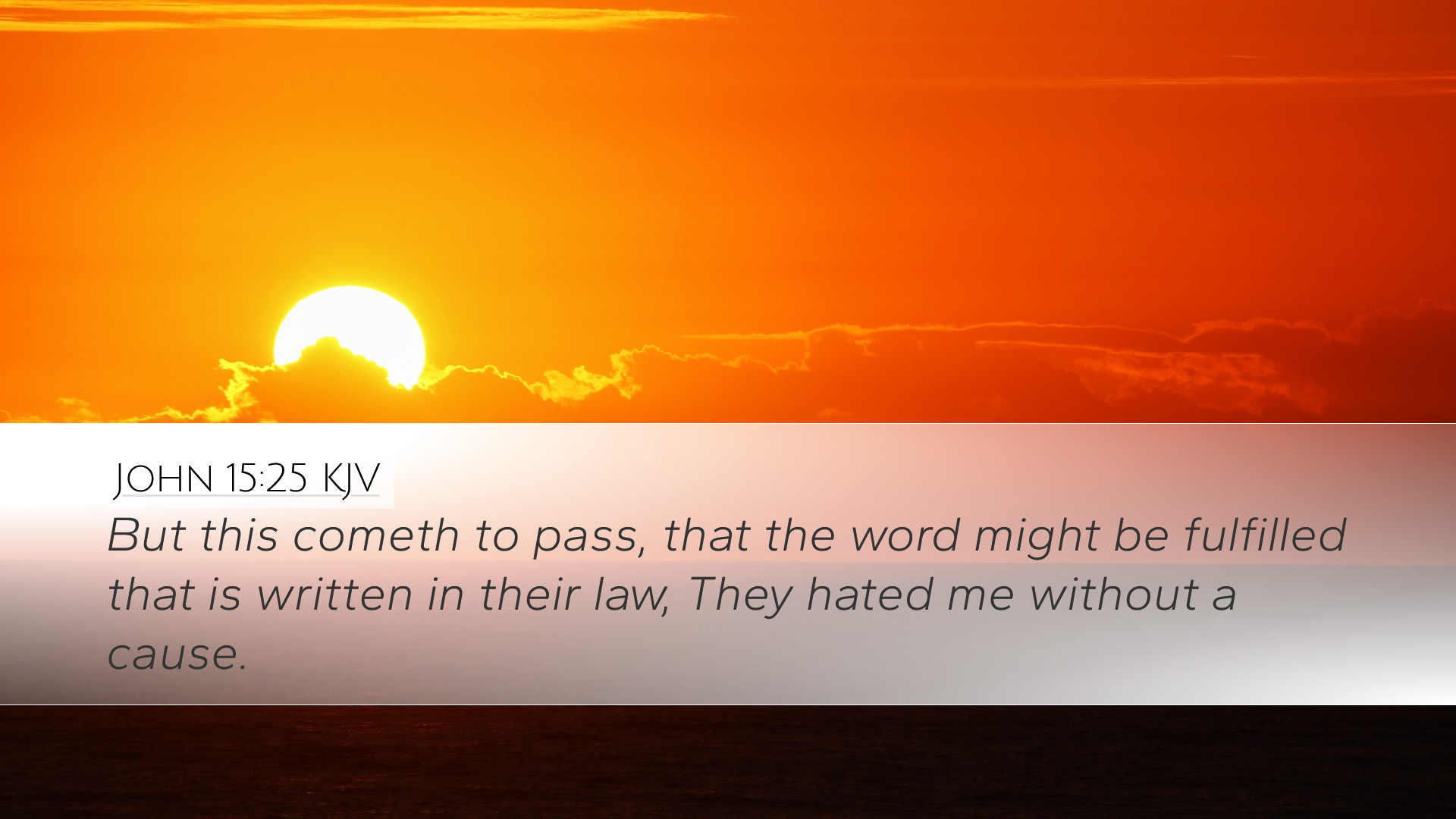Old Testament
Genesis Exodus Leviticus Numbers Deuteronomy Joshua Judges Ruth 1 Samuel 2 Samuel 1 Kings 2 Kings 1 Chronicles 2 Chronicles Ezra Nehemiah Esther Job Psalms Proverbs Ecclesiastes Song of Solomon Isaiah Jeremiah Lamentations Ezekiel Daniel Hosea Joel Amos Obadiah Jonah Micah Nahum Habakkuk Zephaniah Haggai Zechariah MalachiJohn 15:25
John 15:25 KJV
But this cometh to pass, that the word might be fulfilled that is written in their law, They hated me without a cause.
John 15:25 Bible Commentary
Bible Commentary on John 15:25
John 15:25 states: "But this is to fulfill what is written in their Law: 'They hated me without a cause.'" This verse encapsulates the rejection faced by Jesus and serves as a poignant reminder of the animosity that true righteousness can evoke. In this commentary, we will explore insights from public domain sources such as Matthew Henry, Albert Barnes, and Adam Clarke, providing a holistic understanding of this scripture.
Contextual Analysis
This verse falls within the Upper Room Discourse, where Jesus delivers profound teachings to His disciples before His crucifixion. The theme of persecution is prevalent in this section, where Jesus prepares His followers for the hostility they would face from the world.
Historical and Cultural Background
Matthew Henry emphasizes that the hatred directed towards Jesus was not merely personal but a fulfillment of prophetic scripture. The phrase "they hated me without a cause" echoes the sentiments expressed in Psalm 69:4, where the psalmist laments being opposed unjustly. This connection highlights the deep-rooted hostility present in the human condition towards divine truth.
Theological Implications
Albert Barnes notes that this verse fulfills the prophetic utterances concerning the Messiah. He points out that such opposition to Jesus serves to validate His divine mission and the veracity of the Scripture. By highlighting the unjust hatred He received, Barnes argues that the necessity of suffering for righteousness becomes evident, preparing believers for similar trials.
Exegesis of the Text
Adam Clarke elaborates on the phrase "without a cause," suggesting that this denotes the irrational nature of the hatred. People often hate what they do not understand and are threatened by righteousness that challenges their sinfulness. Clarke's insights remind us that the world's animosity towards Christians stems from a fundamental misunderstanding of their message and purpose.
Practical Applications for Believers
This verse has profound implications for believers today. It teaches that one’s commitment to Christ may invite hostility, echoing Peter's exhortation in 1 Peter 4:12-14, where believers are encouraged not to be surprised by the fiery trials they encounter.
- Identification with Christ: Understanding that the hatred directed toward Jesus is a part of the Christian experience allows believers to navigate their trials with courage and faith.
- Encouragement in Suffering: These words of Jesus can provide solace during periods of persecution, reassuring believers that their experiences are shared by Christ himself.
- Validation of Faith: The unjust hatred faced by Jesus becomes a testament to the truth of the Gospel. It reminds believers that their faith is rooted in a tradition of enduring opposition to righteousness.
Conclusion
The message of John 15:25 is clear: hatred and opposition are inevitable aspects of the Christian life. Yet, these adversities serve a higher purpose, fulfilling God's sovereign plans and embodying a call to perseverance in faith. Reflecting on the insights from Matthew Henry, Albert Barnes, and Adam Clarke, we are reminded of Jesus' steadfastness in the face of hatred, which not only fulfills prophetic scripture but also assures believers of the righteous path they are called to walk.
As we engage with this text, may pastors, students, theologians, and scholars deepen their understanding of the challenges inherent in faithful discipleship, drawing strength and encouragement from our Lord, who faced unspeakable hatred but remained faithful until the end.


